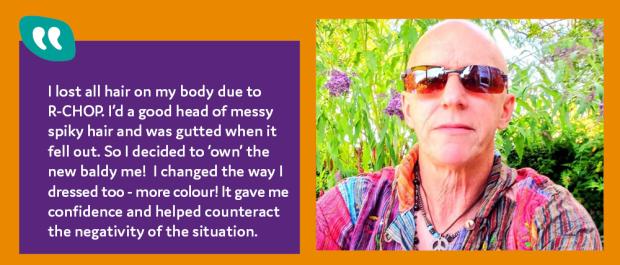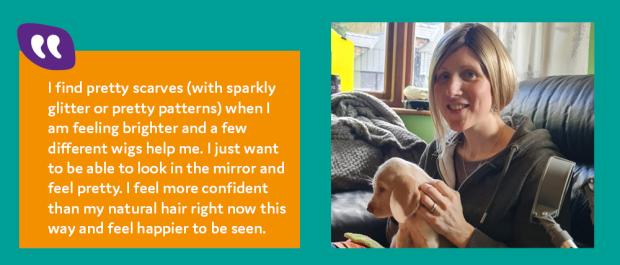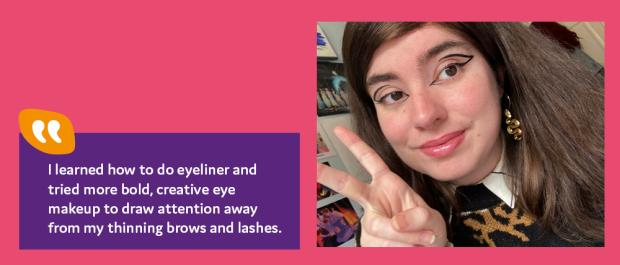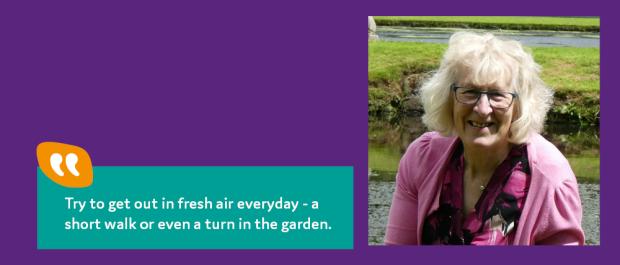Top tips for looking and feeling good
Treatment for lymphoma can have side effects. These side effects vary depending on the treatment and how you react to it, but some can affect physical apperance. Although they are often temporary, side effects can have an impact on how we look, and how we feel about ourselves.
We asked members of our Facebook group for their 'top tips' and suggestions for looking and feeling good, particularly during and after treatment. Here is what they told us.

Coping with hair loss
- It’s a shock to learn that some treatments cause you to lose your hair but I found it really helped to donate it to Little Princess Trust. Knowing that I wasn’t losing it, I was giving it away to help a child in need really helped me accept making the shave without too much hardship.
- If you are going to lose your hair consider getting it cut short before treatment starts. Wearing a beanie hat if your hair starts falling means it doesn't go everywhere.

- I didn’t opt for a wig but invested in bright scarves and cheap statement earrings to wear with loungewear - a very bohemian look. There are lots of tips of tying scarves on line (you can see ours here.)
- After not getting on with a wig, I found some really glamerous headscarves that had a tie scarf. That felt a bit old-school Hollywood to me.
- I found bamboo headscarves super comfy and stylish – I felt good wearing them.
- The turban hats look good and are soft and cozy.
- Getting headwear or wigs before treatment means you can get used to them. Many hospitals have a wig bank so you might like to ask your medical team about this.
- When your hair starts to grow back it can be an opportunity to experiment with new styles - maybe you don’t want your old hair back?! I’ve kept mine short and dyed it pink since it grew back a year ago and I’ve never been happier with it.
- I've kept my hair short. Most of my curls have now gone but I much prefer my short cut. I would probably never have been brave enough to give it a try before.

What to wear
- Think about treating yourself to some pretty, warm outfits that you can lounge around in and use for hospital visits.
- Even if you don't feel like it, it can help to make an effort to get dressed everyday. Some cheerful loungewear and nice underwear can feel really good.
Teeth, skin, makeup and nails
- Get any dental work and check ups done before your treatment starts. Get some new toothbrushes and non-alcohol based mouthwash.
- My skin became so sensitive during treatment and my scalp was very dry and itchy so I used calendula face cream and calendula baby oil on my scalp.
- I kept my skin routine very basic as my skin started reacting to chemotherapy. Gentle cleansers, hyaluronic acid serum to increase hydration, moisturiser with vitamin C to boost the skin with antioxidants and an SPF 50.
- Avoid harsh or scented skin products with ingredients that can irritate skin.
- Sometimes it's best to avoid using your favourite products during treatment as you may be put off them in the future because of the association with treatment.
- Try to moisturise your skin and get some nice foot products to indulge in a home foot spa from time to time.
- Experiment with makeup. Eyebrow pencil can be your best friend. If your lashes fall out, a soft brown eyeliner (I used shadow on a thin brush) can look less harsh and more flattering than black eyeliner.

- Some cosmetics counters have free makeup and advice services for people going through cancer treatment. It's worth checking online or in-store to see if you can book an appointment.
- I took part in the Look Good Feel Better nail class and picked up some amazing tips. I started using nail hardener, cuticle oil, applying black nail varnish on chemo treatment days to limit further damage. I prioritised using handcream which had become dry and sensitive through treatment and constant hand washing and sanitising.
Find out more from our friends at Look Good Feel Better, or check out our videos on looking after your nails, and tutorials for your eyebrows.
Please note: it is important to talk to your medical team before using any new products to check for any possible sensitivities to the ingredients.
Day to day
- It’s good to do things that make you feel like you still have some control of your body. Getting outside for a walk or a 10-minute yoga stretch on the floor can help if you feel like you have no energy.
- Playing my favourite music fairly loud is great or just watching TV.
- Top up your devices with books or download box sets that you can lose yourself in. Its something to do when having chemo, waiting at appointments or when sleeping is difficult.
- Staying connected with others on Facebook or chatting to friends and family on the phone really helps.
- Drinking water keeps you hydrated. Buying some cheap fancy new drinking glasses means that the chore of drinking fluids feels more like an occasion than an ordeal. Using lovely champagne flutes and spirit tumblers with ice and fruit slices helped me enormously.
- Follow your emotions: cry if you need to, rant if you want to, talk if it helps, don’t be frightened to ask for support and laugh as much as you can.

Read our information on wellbeing
We have more information about your physical wellbeing and your emotional wellbeing.
This information comes from our Facebook users and is a list of suggestions from the community based on what they personally found useful and what they would like to pass on to others. This is not intended to be medical advice and is not a replacement for advice from your medical team. If you are looking for specific guidance for your own personal circumstances always consult your medical team.
